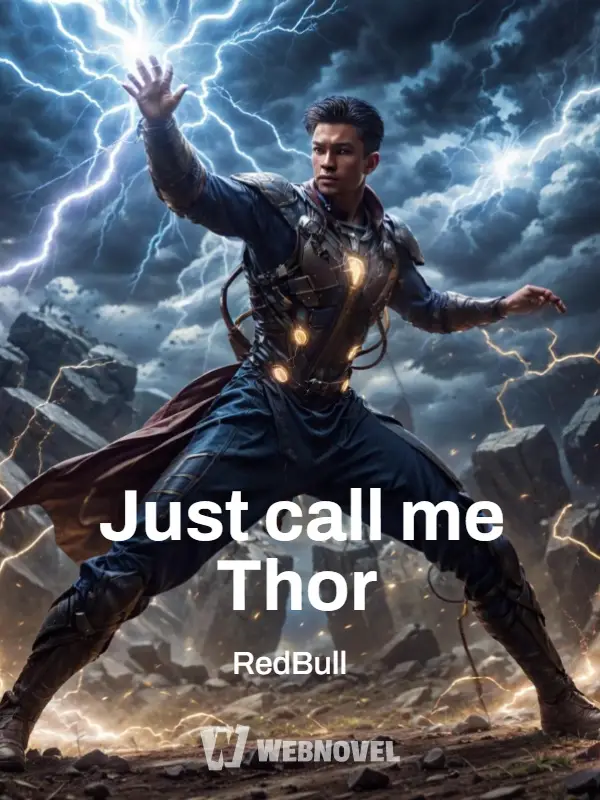
“Just Call Me Thor” introduces Thor, the main character. He grapples with his dual identity as a god and human. His journey is complicated by the challenges of fitting into the modern world while navigating his divine responsibilities. The narrative is rich with tension, as Thor must confront a looming threat that endangers both realms. Accompanying him are key characters like his cunning brother Loki and the warrior Sif. Each has their own motives. Their complex pasts intertwine with Thor’s. This enriches the narrative with multiple layers of conflict. The central conflict unfolds as Thor faces a powerful antagonist who seeks to disrupt the balance between the worlds. This nemesis not only poses a physical threat but also challenges Thor’s understanding of loyalty, strength, and sacrifice. Throughout the novel, pivotal events shape Thor’s character, from epic battles to intimate moments of doubt and realization. The stakes rise as alliances are tested, and the lines between friend and foe blur, driving Thor to confront his past and embrace his true self.
Main Characters
Thor:
At the center of the narrative is Thor, the God of Thunder, who embodies the struggle between his divine legacy and the vulnerabilities of being human. Thor’s journey is marked by a profound internal conflict as he grapples with his identity in a modern world that often dismisses traditional values associated with godhood. His motivations are rooted in a desire to protect his loved ones and uphold his responsibilities as a deity. Throughout the story, Thor evolves from a brash and somewhat reckless figure into a more reflective and self-aware character, learning to balance his formidable powers with compassion and understanding.
As the story progresses, Thor encounters challenges that test his beliefs about strength and leadership. His relationships, especially with Loki and Sif, play crucial roles in shaping his development. The dichotomy between Thor’s heroic ideals and the complexities of his personal life creates a rich character arc, allowing readers to witness his growth as he confronts not only external threats but also his own insecurities and doubts.
Loki:
Loki, Thor’s brother, serves as the primary antagonist whose cunning and ambition create significant obstacles for Thor. Unlike Thor, Loki embodies chaos and manipulation, often acting out of jealousy and a desire for recognition. His motivations are complex; while he seeks power, there are moments when his actions reveal a deeper longing for acceptance and validation from Thor. This duality makes Loki a compelling character, as he oscillates between being a villain and a tragic figure shaped by his tumultuous relationship with his brother.
Loki’s development throughout the story is marked by his manipulative tactics and the personal vendettas that drive him. As the conflict escalates, Loki’s choices lead to catastrophic events that challenge the very fabric of both the mortal and divine realms. This creates a rich narrative tension as Thor must confront not just the threat posed by Loki but also the emotional turmoil of their fractured brotherhood.
Sif:
Sif is a warrior of exceptional skill and courage, providing a strong counterbalance to Thor’s more impulsive nature. Her motivations are intertwined with Thor’s journey, as she strives to support him while grappling with her own feelings of inadequacy and the expectations placed upon her. Sif’s fierce loyalty to Thor highlights her role as both a protector and a potential romantic interest, adding layers of complexity to their interactions.
Throughout the novel, Sif’s character arc involves coming to terms with her own strengths and finding her voice within a world dominated by powerful male figures. Her evolution from a secondary character to a formidable presence in her own right reflects the themes of empowerment and self-discovery that resonate throughout the story.
Plot
The plot of “Just Call Me Thor” revolves around a central conflict that pits Thor against a formidable enemy threatening to disrupt the balance between the mortal and divine realms. The inciting incident occurs when Loki, driven by his ambition and resentment, devises a plan to unleash chaos, targeting both his brother and the very foundations of Asgardian society. This act of betrayal sets off a chain reaction of events that propels the narrative forward, leading to a series of escalating confrontations.
As Thor gathers allies to combat the threat, he faces various trials that test not only his strength but also his resolve and moral compass. Key events include epic battles with mythical creatures, strategic alliances with unexpected characters, and moments of introspection where Thor must confront his fears and insecurities. The tension builds as Loki’s schemes become increasingly dangerous, forcing Thor to make difficult choices that could have far-reaching consequences for both realms.
The climax of the story culminates in an intense confrontation between Thor and Loki, where the true nature of their relationship is laid bare. In this decisive battle, Thor must confront not only Loki’s physical prowess but also the emotional scars of their shared past. This moment of reckoning ultimately leads to a resolution that emphasizes themes of redemption and reconciliation, as Thor learns to embrace his identity while acknowledging the complexities of family and loyalty.
Setting
The setting of “Just Call Me Thor” is a rich tapestry that blends contemporary urban landscapes with elements of Norse mythology. This juxtaposition creates a vibrant backdrop for the story, where ancient gods coexist with modern society. The portrayal of bustling cities, mystical realms, and hidden sanctuaries adds depth to the narrative, allowing readers to immerse themselves in a world where the ordinary and the extraordinary collide.
The influence of the setting extends beyond mere aesthetics; it shapes the characters’ experiences and interactions. The modern world challenges Thor’s traditional notions of heroism, forcing him to adapt to a society that often dismisses his godly attributes. This dynamic serves as a catalyst for character development, highlighting the contrasts between ancient values and contemporary expectations.
Additionally, the settings of key battles and encounters evoke a sense of grandeur and danger, underscoring the stakes of the conflict. From the towering spires of Asgard to the hidden corners of the human realm, each location plays a pivotal role in the unfolding drama, enriching the narrative and enhancing the reader’s engagement.
Themes
“Just Call Me Thor” explores a multitude of themes that resonate deeply with contemporary audiences. At its core, the novel examines the nature of identity and the quest for self-acceptance. Thor’s struggle to reconcile his dual identity as a god and a human reflects a universal journey that many readers can relate to. The narrative delves into the complexities of belonging and the societal pressures that shape individual identity.
Another prominent theme is the exploration of loyalty and betrayal. The relationships between characters, particularly between Thor and Loki, highlight the thin line between love and rivalry. This theme is woven throughout the plot, as characters grapple with their loyalties and the consequences of their choices. The idea that bonds can be both a source of strength and vulnerability adds depth to the narrative, inviting readers to reflect on their own relationships.
The motif of power and responsibility also permeates the story, as Thor learns that true strength lies not just in physical prowess but in moral choices and the willingness to protect others. The balance of power is a recurring element, as characters navigate the consequences of their actions and the impact on those around them.
Author’s Narrative Style
The author’s narrative style in “Just Call Me Thor” is characterized by a seamless blend of humor and gravity. This approach creates a compelling tone that engages readers while allowing for moments of reflection. The use of descriptive language paints vivid images of both the fantastical and the mundane, immersing the reader in the world of the story.
Witty dialogue and character interactions are hallmarks of the author’s style, bringing a sense of authenticity to the characters’ relationships. This balance of light-hearted moments and serious themes enhances the overall reading experience, making the narrative accessible and enjoyable. The author skillfully navigates the complexities of the characters’ emotions, capturing the nuances of their struggles and triumphs.
Author’s Point of View
The story is told from a third-person omniscient perspective, allowing readers to gain insights into the thoughts and motivations of multiple characters. This narrative choice enriches the reader’s understanding of the unfolding events, providing a broader context for the conflicts and relationships at play. Through this lens, readers can appreciate the intricacies of Thor’s journey, as well as the complexities of Loki and Sif’s motivations.
This perspective fosters a sense of connection with the characters, enabling readers to empathize with their struggles and triumphs. By weaving together various viewpoints, the author creates a layered narrative that invites deeper exploration of themes and character dynamics.
Personal Reflection
“Just Call Me Thor” resonates with readers on multiple levels, offering a poignant exploration of identity, loyalty, and the complexities of familial relationships. The themes addressed in the novel are particularly relevant in today’s society, where individuals grapple with the expectations of others while striving to define their own paths. Thor’s journey serves as a metaphor for the universal struggle for self-acceptance and the courage it takes to embrace one’s true identity.
The incorporation of Norse mythology into a modern context adds a unique layer of intrigue, inviting readers to reflect on the timeless nature of these themes. The story’s blend of humor and drama creates an engaging narrative that captivates while encouraging reflection on personal values and relationships.
SUGGESTIONS:
- The Science of Self-Pleasure: Is Masturbation Really Good for You?
- The Medical Ethics of Treating Minors Against Parental Wishes
- Exploring the Medical Consequences of Organ Donation Policies!
Conclusion
In conclusion, “Just Call Me Thor” is a masterfully crafted tale that weaves together mythology, modernity, and profound themes of identity and loyalty. Through its well-developed characters, engaging plot, and rich settings, the novel invites readers on a journey of self-discovery and reflection. As Thor navigates the challenges of being both a god and a human, the story resonates with timeless questions about belonging and the nature of strength. This captivating narrative leaves a lasting impression, encouraging readers to contemplate their own journeys in a world that often demands clarity amidst chaos.

